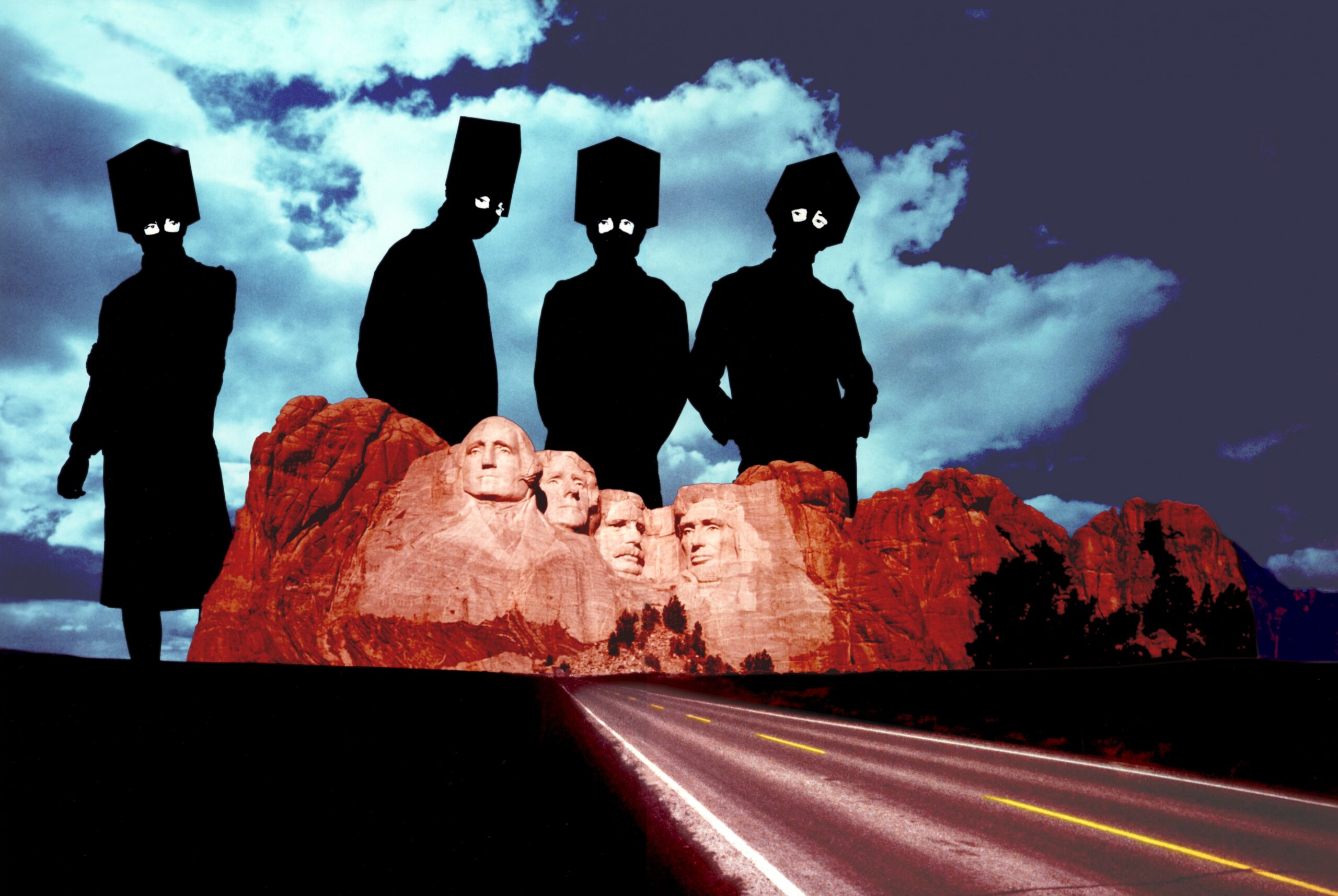Novelist Gary Shteyngart crisscrosses the country looking for success. Also, we explore the “Theory of Obscurity” with filmmaker Don Hardy, hear a Black Friday tale, and hit rewind to a time when the Walkman ruled the world.
Featured in this Show
-
Novelist Gary Shteyngart Finds 'Success' Crisscrossing US
Acclaimed novelist Gary Shteyngart is a self-described chronicler of Manhattan. Before penning his latest novel, “Lake Success,” Shteyngart took an inventory of his social network and noticed most of those closest to him had been priced out of the city.
“The only people left were people who worked in banks, or the people who loved them,” Shteyngart quips.
So, he decided to get to know them and framed “Lake Success” around these Wall Street characters.
“What was in front of me were hedge fund managers and lowly investment bankers, but mostly hedge fund managers and private equity people and so I decided to write about that since they were the only people left,” he said.
If you’re unfamiliar with what a hedge fund manager does, you’re not alone. Shteyngart — who is known for working with celebrities to make trailers for his books — tapped actor Ben Stiller to help caricaturize them.
Shteyngart summed up their job description to WPR’s “BETA” in a more somber tone.
“Essentially all of this is a giant scheme to transfer money from poor people of the middle class to the pockets of a tiny 0.1 percent of the population and of course, the last couple of years have only enabled that to happen all the more,” he said.
“Lake Success” follows beleaguered hedge fund manager Barry Cohen as he escapes New York via Greyhound bus in the midst of an U.S. Securities and Exchange Commission investigation and after an autism diagnosis for his 3-year-old son. Cohen’s trek through the heartlands of America to locate his college girlfriend reveal a quest for a simpler time and an eye opening look at an alternate American experience.
“I think at one point, the book describes it as a middle-aged version of ‘On the Road,’” Shteyngart says. “I think that’s kind of accurate because all of the dreams and excitement have been replaced with a feeling of ‘Oh my God, I really screwed up.’”
Shteyngart immersed himself with hedge fund managers to research the book. He claims he became somewhat of a “hedge fund whisperer” of sorts. Shteyngart observed that most of the managers he met were not any happier, despite their immense wealth.
“It was a kind of project where I entered thinking ‘OK, I’m going to get to know the masters of the universe,’ but I left it feeling almost allergic to money because I saw how little it accomplished in terms of making people happier,” he said
Shteyngart claims most of these managers lead a very isolated existence.
“When all you’re doing is following the world as blips on a screen on a Bloomberg monitor, you’re not really living,” Shteyngart said. “It’s very hard to connect with even the people around you, your spouse, your children.”
Shteyngart talks about how this isolation could manifest itself in the form of an unceasing competitiveness.
“Many of the hedge fund guys that I would meet would talk about their fellow competitors and say ‘Well, Jim is on the spectrum or Bob is on the spectrum,’” Shteyngart said. “One of the main things they wanted to say about each other that they had better social skills than someone else.”
This development, coupled with his budding friendship with autism spokeswoman Temple Grandin, inspired Shteyngart to explore this theme of neurodiversity in the novel through the character of Cohen’s son.
In addition to spending a lot of time with hedge fund managers, Shteyngart also took the very same Greyhound bus trip that his protagonist does.
“Taking ‘The Hound’ as we call it or ‘The Dog’ across the country in the span of four months was exhausting. Something you do on a dare,” he explained.
Shteyngart very specifically wanted to route his character through the South.
“When you look at the way our country works, the South has an outsized influence, I think. It’s almost like the civil war never ended,” Shteyngart says. “At least in the ways it gets to set the dialogue for this country.”
Shteyngart’s bus trip occurred during the summer of 2016 and coincided with the launch of Donald Trump’s candidacy for president. Shteyngart began to witness firsthand the ascendancy of a new boldness when it came to voicing views on race.
He cites an occurrence in a southern city — the anecdote works its way into the novel — where the bus took on a “gaggle” of white supremacists who began to espouse bigoted views very openly.
“Of course people have thought these horrible things, but in the first summer of Trump in 2016, people could get up on a bus, that was mostly people of color, and proclaim these things,” he said. “What we did is we looked away. We pretended we were asleep. We didn’t challenge them even though we were in the majority. I think this book is partly about that. It’s partly about this ascendancy of this new America.”
“Lake Success” captures this contemporaneous America quite well as a result. However, Shteyngart doesn’t view it all as a net negative.
“You could tell that (the white supremacists) were in some measure on the way down and that a lot of the other people on the bus were in some ways on the way up. They were working hard. They saw an opportunity that was offered them to advance in life,” he said.
He also argued that the country itself was a beautiful respite and provided much needed perspective for anyone sequestered into any kind of bubble, coastal or otherwise.
“The beauty of the country, from the foothills to the mesas, is so striking and as seen through a Greyhound window — which is a pretty big window if you find the right place to sit — it’s almost like the country becomes its own show.”
-
The Residents' 'Theory Of Obscurity' Allows Them To Pursue Pure Art
The Residents are an art collective known in some circles for their avant-garde music and multimedia work. You may have seen photos of them wearing their trademark tuxedos and eyeball-head masks with top hats (like in the above photo). Their fans include magician/comedian Penn Jillette and “The Simpsons” creator Matt Groening.
But who exactly are the people underneath those giant eyeball heads? One of them was Hardy Fox. He was the band’s co-founder and chief composer. Fox died on Tuesday, Oct. 30, 2018 after battling brain cancer.
Don Hardy should be able to reveal the true identities of the other band members. He’s the director of “Theory of Obscurity: A Film About The Residents.”
So WPR’s ‘BETA’ asked Hardy – Who are The Residents? “I’ll never tell,” he replied.
Hardy has lived in the Bay Area for several years and says it really feels like home now. One of the things that he likes so much about living out there is that there are a lot of mysteries.
One night, while having drinks with a couple of friends, Josh Keppel and Bart Bishoff, the discussion turned to The Residents. It was a band that Hardy didn’t know much about.
“Josh had known them a little bit,” Hardy said. “He’d helped shoot a concert DVD for them and Bart had been a lifelong fan. And just hearing how they talked about the band, it just seemed very interesting and very much about the Bay Area as a whole, especially the arts scene back in that early 70s time period. So it just seemed like a very interesting subject to try to tell a story about a band where you can’t interview the band.”
Hardy said that even though he didn’t know that much about the band, he was intrigued enough by the group’s philosophy.
“I really appreciate what The Residents stand for, which is this idea of creating art without celebrity. And that’s so rare in our world today and it’s something that is a core belief that they have is that the work should stand for itself. And you should do what you really want to do, what drives you, and not necessarily what the fans want,” Hardy said.
Since The Residents have managed to remain anonymous since they started in 1974, it seems that one of the biggest challenges that Hardy faced in making the film was how to make an authoritative documentary about an anonymous group. Was that something he thought a lot about before filming began?
“Probably I didn’t think about it enough or I wouldn’t have gone down that road,” Hardy said. “It had to do with their 40th anniversary. That really drove the idea for making the film that hey, they’re going out to do this 40th-anniversary tour. And it’s the first time in their long history that they’ve really been in a reflective place where they’re talking about all of the different ups and downs of their career so it was a perfect time to try to document them.”
Hardy’s documentary includes a clip from Les Claypool of the rock band Primus in which he offers a very unique description of The Residents’ music: “It’s like a fungus. It just kind of takes over and then you kind of get used to the fungus. And then you learn to appreciate the fungus. So The Residents was a big part of my musical fungus.”
Does Hardy agree with Claypool’s description?
“Yeah, it’s very fungal. That’s a good way to put it. But I think to look at The Residents as a whole, it isn’t just about the music. It’s about the art that goes along with it and you don’t have to like it all. In fact, I don’t think anybody could sit here and say — Oh, maybe there’s a couple of superfans — they would say they’ve loved everything they’ve ever done. But it is very varied,” he said. “There are some earlier albums, like I would say ‘Fingerprince’ and ‘Duck Stab,’ you know, maybe those are two of the more accessible ones. And then there’s an album like ‘Eskimo’ that’s very tough.”
In the early days of MTV, The Residents enjoyed a lot of music video airplay.
“When MTV first started, they had very little content to actually put on there so The Residents became one of the bands in high rotation, which is so bizarre knowing how MTV changed over the decades,” Hardy said. “So they had this clip laying around for a song called ‘Hello Skinny’ that is very strange. It’s a clip directed by Graeme Whifler, who was an early collaborator with The Residents. And it stars just one strange figure and follows his travels through a night in, I guess, San Francisco. And ultimately they use a lot of still photos in there and do some movement on the still photos. But it’s a very creepy clip.”
Hardy says it was The Residents’ renegade attitude to go wherever their imaginations would take them that really inspired his documentary.
“I find music docs as a whole to be very boring. What interested me the most about The Residents is that they just played by their own rules. And you could go anywhere with it. The best compliment I received since the film has been out is from a 12-year-old girl that got dragged to see it by her father who had collaborated on an art project with The Residents 20 years ago. And she came up to me after the screening and said, ‘I thought The Residents were just some dumb thing my Dad was into but now after watching this, it makes me want to go out and make art.’ So if more people can take that away from it, that you don’t have to necessarily like them but like what they stand for. They didn’t contemplate the ‘what ifs?’ of could they be successful musicians? In fact, they didn’t even know how to play their instruments. But it made the create something else.”
Editor’s note: This story was originally published Thursday, Nov. 1, 2018. It aired on “BETA” Saturday, Nov. 10, 2018.
-
Nana Kwame Adjei-Brenyah is making a name for himself with his debut short-story collection, “Friday Black.” He takes on the horrors of consumerism with his title story, “Friday Black.” Here’s Adjei-Brenyah reading an excerpt.
-
When The Walkman Ruled The World
If you’re old enough, you remember that there was a time when we didn’t walk around listening to music on our iPods or cellphones. We listened to music on a device called the Walkman.

In this July 2009 file photo, Sony’s first Walkman is shown at a special display commemorating the Walkman’s 30th anniversary at the Sony Archive building in Tokyo, Japan. Shuji Kajiyama/AP PhotoAnd if you’re too young to remember the Walkman, we thank you for helping us attract that coveted 18 to 34 demographic. Please recommend “BETA” to all of your fellow 18- to 34-year-olds.
Rebecca Tuhus-Dubrow was born in 1978, the year before the Walkman debuted. Even though she was just a toddler during the Walkman’s early years, she’s gone on to write a book called “Personal Stereo.”
“When I started to think about it more and research it more, I realized that it was an even richer subject than I had originally realized because, as I say in the book, the Walkman was arguably the first mass personal device,” Tuhus-Dubrow told WPR’s “BETA.”
“It was the first time people were carrying a device around with them in public that provided them with their own personal form of entertainment,” she continued. “You can argue the transistor radio, but this was more individualized and immersive. So I started to see it as the ancestor of our current personal devices and started to learn about the ways that it had influenced and changed public space at the time that it was introduced in the early ’80s.”
The Walkman was invented by Masaru Ibuka and Akio Morita, the co-founders of Sony.
“Nobody at the company thought it was a good idea,” Tuhus-Dubrow said. “They thought it would be a complete flop because, first of all, it just wasn’t done. People just didn’t listen to headphones in public at the time. It just looked really weird. I guess they thought that it was kind of anti-social to go around listening to music that no one else could hear.”
Sony employees also doubted anyone would want a tape player that wasn’t able to record.
“Because at the time it was called the tape recorder, so that was a really integral part of its function,” Tuhus-Dubrow said. “And in order to make it small enough to be the kind of portable device that they wanted it to be, they had to remove the recording function. So that just seemed preposterous to them at the time because they were tape recorder engineers, so they thought a tape recorder that doesn’t record, that’s a deficient product.”

Akio Morita, Chairman of Sony Corp., laughs during a meeting where he displays a portable Walkman stereo tape player in Tokyo, Japan, Feb. 2, 1982. Morito founded the electronics firm in post-war Japan. Neal Ulevich/AP PhotoThe Walkman debuted in July 1979 to near-instant acclaim.
“It was rapturous. People almost immediately, they just loved it — just this kind of unprecedented, intimate experience of listening to music right next to your ears and being able to move through a landscape, through a city at the same time,” Tuhus-Dubrow said. “They compared it to cinema, to the experience of either watching a movie or being in one or both. They compared it to drugs. A lot of people talked about how intoxicating it was. It was a big sensation.”
As Tuhus-Dubrow points out in her book, people couldn’t talk about the Walkman without talking about an earlier sonic innovation — the boombox, also known as the “boogie box” or the “ghetto blaster.”
“Since the boombox had just fairly recently achieved some popularity and some people really loved it, it was kind of festive,” Tuhus-Dubrow said. “One term that I came across was ‘a sonic campfire.’ You know, someone would bring a boom box to the park and people would gather around and basically have a party. But, of course, not everyone felt that way. And when people would blast their music on the subways, a lot of people found it pretty annoying. So the Walkman was frequently compared to the boom box and it was seen as more courteous because you weren’t imposing your choice of music on everyone around you. But it was also the fact that when you were listening to the Walkman, you were having this private experience in public space and you were kind of withdrawn into yourself, that was also unsettling to a lot of people.”
Tuhus-Dubrow argues it wasn’t just a portable listening device that changed when and where we listened to music. She also makes the case for it as a symbol of the 1980s.
“I found it fascinating that the Walkman could play these different roles. For teenagers, it was seen as just a way of being kind of lazy and self-indulgent. And for Yuppies, it was seen as a way of being very energetic and goal-oriented and self-improving,” Tuhus-Dubrow said.
Episode Credits
- Doug Gordon Host
- Adam Friedrich Producer
- Gary Shteyngart Guest
Wisconsin Public Radio, © Copyright 2026, Board of Regents of the University of Wisconsin System and Wisconsin Educational Communications Board.




